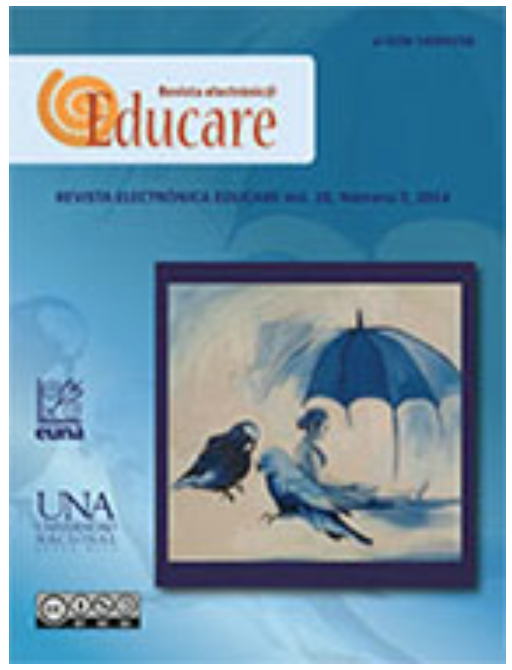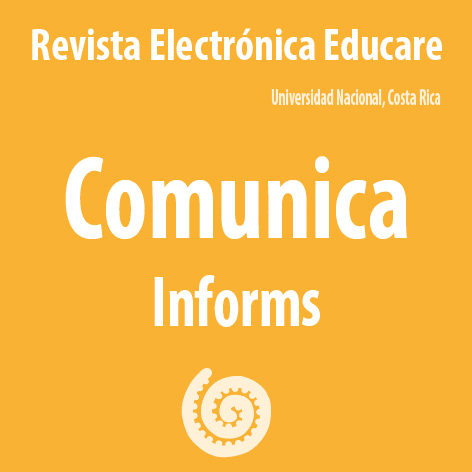Dilemas morales para contextos rurales: Construcción y validación en básica secundaria de una institución educativa colombiana
DOI:
https://doi.org/10.15359/ree.18-2.5Palavras-chave:
Dilema, moral, juicio, ruralidad, básica secundaria.Resumo
Recibido 8 de setiembre de 2013 • Corregido 28 de febrero de 2014 • Aceptado 2 de abril de 2014
Este artículo se deriva de un trabajo de investigación cuyo propósito central fue construir y validar dilemas morales para estudiantes de contextos rurales. En una primera fase, la profesora recopiló situaciones morales de interés para sus estudiantes; en la segunda, los investigadores diseñaron dilemas atendiendo a criterios predeterminados, y en una tercera la profesora desarrolló nueve dilemas en el aula. En esta última fase el equipo analizó la información de videos, carteleras y hojas de trabajo del estudiantado, diario de campo de la profesora y registros de observación de los investigadores. Así se llegó a los resultados: quince dilemas morales; de los cuales se llevaron a la práctica nueve, y seis de aquellos resultaron válidos. Los tres que fueron declarados no válidos son susceptibles de afinamiento, gracias a los aprendizajes que la experiencia le deja al equipo en cuanto a la construcción misma de los dilemas, al desempeño de los estudiantes frente a los dilemas y al rol docente en el desarrollo de dilemas en el aula. Así se abre un panorama rico en problemas de investigación diversos relacionadas con los dilemas morales.
Referências
Arias, A. (2010). La construcción de la ciudadanía: Un trabajo de la escuela, la sociedad y la familia. San Gil: Fundación Universitaria de San Gil.
Ascuy, L., Nápoles, E., Infantes, L., Rivero, M. y Ramírez, R. (enero-abril, 2004). Algunas consideraciones teóricas acerca de la enseñanza problémica. Humanidades Médicas, 4(10). Recuperado de http://www.bvs.sld.cu/revistas/revistahm/numeros/2004/n10/art/catedra.htm
Camps, A. (2003). Texto, proceso, contexto, actividad discursiva: Puntos de vista diversos sobre la actividad de aprender y de enseñar a escribir. En A. Camps (Comp.) Secuencias didácticas para aprender a escribir (2a reimp., pp. 13-32). Barcelona: Graó.
Cassany, D. (1995). La cocina de la escritura. Barcelona: Anagrama.
Castro, C. y Segura, Y. (2012). La argumentación interaccional en los procesos de mediación y resolución de conflictos. En R. Pinilla y Y. Gutiérrez (Comps.). La oralidad en contextos diversos: Aportes investigativos para su discusión y comprensión (pp. 473-481). Bogotá: Universidad Distrital Francisco José de Caldas.
Chaux, E., Bustamante, A., Castellanos M., Jiménez, M., Nieto, A. M., Rodríguez G. I., Velásquez, A. M. (junio, 2008). Aulas en paz: 2. Estrategias pedagógicas. Revista Interamericana de Educación para la Democracia, 1(2), 124-145. Recuperado de http://www.uruguayeduca.edu.uy/Userfiles/P0001/File/aulas%20en%20paz%20y%20estrategias.pdf
Cortina, A. (1997). El mundo de los valores. “Ética mínima” y educación. Bogotá: El Búho.
Cortina, A. (2009). Ética de la razón cordial. Educar en la ciudadanía en elsiglo XXI. Oviedo: Ediciones Nobel.
Domínguez, M. J. (2011). Acompañémonos en el camino de nuestra educación como personas. Vivencias pedagógicas de una maestra feliz. Bucaramanga: Universidad Industrial de Santander.
Donoso, M. A. (2012). Gestión de la convivencia y solución de conflictos en centros educativos. Revista Iberoamericana de Educación, 59(2), 1-14. Recuperado de http://www.rieoei.org/deloslectores/4024Aird.pdf
Fernández, M. y Hachén, R. (s. f.). De la enseñanza de la argumentación a la argumentación como enseñanza. La instancia de corrección. En Simposio de la Cátedra Unesco: Enseñanza de la argumentación (pp. 1341-1352). Recuperado de http://ww2.filo.uba.ar/contenidos/investigacion/institutos/linguistica/pdf/laargumentacion/simposio_unesco.pdf
Flórez, R. (1998). Hacia una pedagogía del conocimiento. Bogotá: MacGraw-Hill.
Goodnow, J. (2001). Desarrollo moral: Cuestiones y enfoques. En W. Van Haaften, T Wreen y A. Tellings (Comp.), Sensibilidades morales y educación (Vol. I, pp. 77-102). Barcelona: Gedisa.
Jaramillo, R. y Bermúdez, Á. (s. f.). El dilema moral. Eje central de una estrategia pedagógica. Recuperado de http://www.colombiaaprende.edu.co/html/docentes/1596/articles-58618_marco_referencia.pdf
Kohlberg, L. (1992). Estadios morales: Una formulación actualizada y respuesta a los críticos. Madrid: Desclée de Brouwer.
López, A. (2004). La lectura en voz alta como elemento importante en la formación de lectores. En M. Rincón y B. Peña (Eds.), Memorias del 6° Congreso Nacional de Lectura para construir nación (pp. 125-136). Bogotá: Fundalectura.
Mejía, J. F. ( 2004). Estrategia institucionales. En E. Chaux, J. Lleras y A. M. Velásquez (Comps), Competencias ciudadanas: De los estándares al aula. Una propuesta de integración a las áreas académicas (pp. 83-91). Bogotá: Ministerio de Educación Nacional y Ediciones Uniandes. Recuperado de http://www.colombiaaprende.edu.co/html/mediateca/1607/articles-75077_archivo.pdf
Mejía, J. F. y Rodríguez, G. I. (2004). Dilemas morales (Cap. 2). En E. Chaux, J. Lleras y A. M. Velásquez (Comps.), Competencias ciudadanas: De los estándares al aula. Una propuesta de integración a las áreas académicas (pp. 41-51). Bogotá: Ministerio de Educación Nacional y Ediciones Uniandes. Recuperado de http://www.colombiaaprende.edu.co/html/mediateca/1607/articles-75077_archivo.pdf
Realpe, S. (julio-setiembre, 2001). Dilemas morales. Estudios gerenciales, 80. Recuperado de http://www.icesi.edu.co/revistas/index.php/estudios_gerenciales/article/view/60/58
Savater, F. (2003). El valor de elegir. Barcelona: Ariel.
Savater, F. (2008). Ética para Amador (17ª ed.). Barcelona: Ariel.
Valencia, A. (2006). Ética de la discusión. En Colombia la alegría de pensar (2ª ed., pp. 67-73). Bogotá: Universidad Autónoma de Colombia y Número Ediciones.
Weston, A. (2005). Las claves de la argumentación (10ª ed.). Barcelona: Ariel.
Publicado
Como Citar
Edição
Seção
Licença
- Caso o artigo seja aceito para publicação, os autores permitem a cessão GRATUITA, EXCLUSIVA E INDEFINITA de seus direitos patrimoniais à Universidade Nacional (UNA, Costa Rica). Para obter mais detalhes, consultar a Carta de originalidade e cessão de direitos.
- Direitos de reutilização: a UNA concede aos AUTORS(AS) o direito de reutilizar para qualquer propósito, incluindo o auto arquivo, e a publicação na Internet ou em qualquer website da versão final aprovada e publicada (post print) do artigo, desde que seja feita para fins não lucrativos, não gere trabalho derivado sem autorização prévia e respeite as fontes de autoria.
- A oferta e possível publicação do artigo na Revista Electrónica Educare reger-se-á pelas suas políticas editoriais, pela regulamentação institucional da Universidade Nacional e pela legislação da República da Costa Rica. Além disso, quaisquer divergências futuras de opinião ou disputa serão resolvidas de acordo com os mecanismos de Resolução Alternativa de conflitos e a Jurisdição da Costa Rica.
- Em todos os casos, entende-se que as opiniões emitidas são de responsabilidade dos autores e não refletem necessariamente a posição e a opinião da Educare, CIDE ou da Universidade Nacional, Costa Rica. Entende-se também que, no exercício da liberdade acadêmica, os autores realizaram um rigoroso processo científico-acadêmico de pesquisa, reflexão e argumentação e que se enquadra na área temática de interesse da Revista.
- Os artigos publicados pela Revista Eletrônica Educare utilizam a Licença Creative Commons:
















 The articles published by Educare Electronic Journal can be shared with a Licença Creative Commons :
The articles published by Educare Electronic Journal can be shared with a Licença Creative Commons : 



